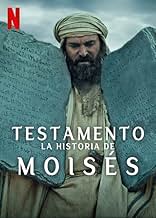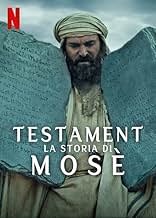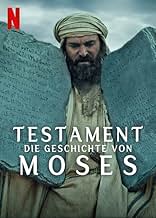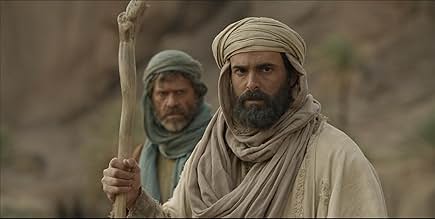Testamento: A História de Moisés
Título original: Testament: The Story of Moses
AVALIAÇÃO DA IMDb
6,3/10
4,3 mil
SUA AVALIAÇÃO
Esta série documental conta como foi a incrível vida de Moisés como príncipe, profeta e muito mais, com perspectivas de teólogos e historiadores.Esta série documental conta como foi a incrível vida de Moisés como príncipe, profeta e muito mais, com perspectivas de teólogos e historiadores.Esta série documental conta como foi a incrível vida de Moisés como príncipe, profeta e muito mais, com perspectivas de teólogos e historiadores.
Explorar episódios
Avaliações em destaque
I came with reservations because of other comments, but apparently they didn't watch it until the end, because I did in fact find it very entertaining, insightful, touching and also very realistic.
I like how they show Moses for what he really was - a shy, reserved and troubled individual. They don't hide the fact that he lived most of his life as a fugitive. They also show accounts of his interactions with various local people from polytheistic tribes and other faiths, which most other shows about topics such as the bible omit. Reality is much more diverse and complex than just the mythical story, and they honor this fact historically.
If this would have been a show trying to "convert" you (Judaism is against conversion anyway), they would have painted Moses in a much better light and also focused only on the "mono" theistic part of that history, but they actually do the opposite.
What I'm trying to say is that this show is not religious in any way, it's pretty much objective and shows that everyone has good and bad sides, such as fitting real life. It even shows GOD as a multifaceted entity such as he is in the Hebrew bible and his complex relationship with Moses, and tackle grand philosophical questions such as "Why did god create evil in the first place?".
So in essence, they do bring this biblical story to life and the main actors in my point of you have very realistic relationships among themselves.
The only fault I have to say is that yes, it is a bit "cliche", but I think only because it's a story we are all familiar with. They did succeed in bringing in a fresh historical perspective. Even though it's in English, and obviously adapted to a modern crowd so that not every single detail is precisely accurate or sometimes dramatized, I applaud the fact that they made it feel so raw and intimate. Overall, I recommend.
I like how they show Moses for what he really was - a shy, reserved and troubled individual. They don't hide the fact that he lived most of his life as a fugitive. They also show accounts of his interactions with various local people from polytheistic tribes and other faiths, which most other shows about topics such as the bible omit. Reality is much more diverse and complex than just the mythical story, and they honor this fact historically.
If this would have been a show trying to "convert" you (Judaism is against conversion anyway), they would have painted Moses in a much better light and also focused only on the "mono" theistic part of that history, but they actually do the opposite.
What I'm trying to say is that this show is not religious in any way, it's pretty much objective and shows that everyone has good and bad sides, such as fitting real life. It even shows GOD as a multifaceted entity such as he is in the Hebrew bible and his complex relationship with Moses, and tackle grand philosophical questions such as "Why did god create evil in the first place?".
So in essence, they do bring this biblical story to life and the main actors in my point of you have very realistic relationships among themselves.
The only fault I have to say is that yes, it is a bit "cliche", but I think only because it's a story we are all familiar with. They did succeed in bringing in a fresh historical perspective. Even though it's in English, and obviously adapted to a modern crowd so that not every single detail is precisely accurate or sometimes dramatized, I applaud the fact that they made it feel so raw and intimate. Overall, I recommend.
Lots of good things in this and interesting facts shared, in particular by the Christian and Jewish commentators. Also some errors, not limited to:
As with all these movies about Moses, so much is shown about the journey to the Red Sea and the crossing, that the end is always rushed.
But, let's not decry that this is on Netflix and many people will hear the story, who may not otherwise have done.
- Moses went up the mountain twice to get the 10 commandments, not once as is shown here.
- No need to show Moses' mum talking to him at the end as a spirit ghost.
- No partying shown around the golden calf as the bible recalls.
- No Tabernacle shown.
As with all these movies about Moses, so much is shown about the journey to the Red Sea and the crossing, that the end is always rushed.
But, let's not decry that this is on Netflix and many people will hear the story, who may not otherwise have done.
One can't properly discuss this 3-part series without discussing scriptural accuracy and Biblical concepts.
The story of Moses and the exodus from Egypt is one of the most basic, clear-cut, black and white accounts in the Bible. So one may rightly wonder how "learned" professors, religious leaders and "Bible scholars" can't get it right, can't answer the most basic questions, and that film makers seem mentally incompetent to get the account correct-- especially in a self-proclaimed "documentary".
This is supposedly a docu-drama, part presentation and part oration by educated authorities. So it's reasonable to wonder why one guy says, "Why did God kill innocents in Egypt? We don't have a good answer to that." Seriously?
While the documentary lightly touched on this, is this authority unaware that just 80 years prior the Egyptians showed no mercy in slaughtering babies of the Israelites for at least several months (perhaps years)? Is he unaware of the scriptural law of "An eye for an eye, tooth for tooth, life for life"? So how is it that this "scholar" says we don't really have an answer for God's decisions in these things? The Israelite babies were "innocents" too. "Whatever you sow, this you will also reap." Universal judgement and consequence does not alter and deviate according to individual human whims, opinions and perceptions.
The Egyptians could have spread blood on their doorposts and been spared as well. They were surely aware of what the Israelites were doing. News travels fast; all of the Israelites knew these things-- and they vastly outnumbered the Egyptians. But the Egyptians showed no respect for God's authority (even after 9 plagues had already happened), and so paid the price of their stubborn arrogance.
How did that supposed Bible scholar not understand any of these things? Pharaoh and indeed all of Egypt were taught a lesson that would reverberate throughout history, even thousands of years later: don't mess with God.
That is just one fallacy of this "documentary"... and there are many similar issues.
This poorly-conceived series presents Moses as someone who is clueless, who is at times very haughty and who regularly "argues" with and denies God. That is not what the Bible presents. Yes, Moses is presented in scripture as having a temper and at times erred, even seriously, as we all do. It also states that he followed God's directions to the letter, that he was the greatest prophet in the history of Israel, and calls Jesus himself the "greater Moses". This is not a title that would be given if Moses were haughty, rebellious and clueless.
People can choose to agree with the Bible or not, believe it or not... but if one is going to make a supposed documentary of a prominent Bible figure, they should get it right, according to the Biblical account.
They state that Moses "never reached the Promised Land", which is true. But they left out what lay ahead for him in the resurrection that is spoken of all through the Bible. From Moses' standpoint, he closed his eyes in death and immediately reopens them in a "Promised Land" far superior to that of the ancient Israelites. Yet all those religious authorities and the documentary itself totally omitted that significantly important point. It made it look like Moses' life was useless, that his death was the end for him, and only his offspring benefited from his faithfulness. What a pitiful account.
They talk about the Egyptian Army and Pharaoh-- who were stupidly charging through the Red Sea, totally determined to wipe out the Israelites. Then someone's daughter asks, "Weren't they God's children too?" and her father says, "What an amazingly astute observation." His failure to reply and explain the matter to her was not so astute.
Were these "God's children too?" No! They were Israel's enemy, bent on genocide even after personally witnessing the ten plagues. They worshiped false gods and were intent on wiping out God's chosen people to the last man, woman and child. How more ungodly could that army have been? That is the answer he should have given his daughter.
It seems these authorities were too busy focusing on the meanings of Hebrew words to understand the basic principles of Biblical justice and the simple concepts of good and evil.
The filming of this was rather nice, and it was refreshing to see actual miracles for once (rather than attempted "scientific explanations"). But this 3-part series is just as inaccurate and senseless as any Hollywood presentation to date. Although claiming to be a documentary, it doesn't accurately stick to the Biblical account and seems quite oblivious to concepts of faith and divine justice. They present Moses as an unfaithful, incompetent bungler who was just stumbling along. In reality he was the person who God used to bring the Israelites out of bondage from the most powerful nation on Earth, and is considered Israel's most prominent prophet in history.
They just never get it right. Frankly, if all you want is a fictional rendition of this account, I'd stick with Charlton Heston. THE TEN COMMANDMENTS is shorter and more entertaining. ;D.
The story of Moses and the exodus from Egypt is one of the most basic, clear-cut, black and white accounts in the Bible. So one may rightly wonder how "learned" professors, religious leaders and "Bible scholars" can't get it right, can't answer the most basic questions, and that film makers seem mentally incompetent to get the account correct-- especially in a self-proclaimed "documentary".
This is supposedly a docu-drama, part presentation and part oration by educated authorities. So it's reasonable to wonder why one guy says, "Why did God kill innocents in Egypt? We don't have a good answer to that." Seriously?
While the documentary lightly touched on this, is this authority unaware that just 80 years prior the Egyptians showed no mercy in slaughtering babies of the Israelites for at least several months (perhaps years)? Is he unaware of the scriptural law of "An eye for an eye, tooth for tooth, life for life"? So how is it that this "scholar" says we don't really have an answer for God's decisions in these things? The Israelite babies were "innocents" too. "Whatever you sow, this you will also reap." Universal judgement and consequence does not alter and deviate according to individual human whims, opinions and perceptions.
The Egyptians could have spread blood on their doorposts and been spared as well. They were surely aware of what the Israelites were doing. News travels fast; all of the Israelites knew these things-- and they vastly outnumbered the Egyptians. But the Egyptians showed no respect for God's authority (even after 9 plagues had already happened), and so paid the price of their stubborn arrogance.
How did that supposed Bible scholar not understand any of these things? Pharaoh and indeed all of Egypt were taught a lesson that would reverberate throughout history, even thousands of years later: don't mess with God.
That is just one fallacy of this "documentary"... and there are many similar issues.
This poorly-conceived series presents Moses as someone who is clueless, who is at times very haughty and who regularly "argues" with and denies God. That is not what the Bible presents. Yes, Moses is presented in scripture as having a temper and at times erred, even seriously, as we all do. It also states that he followed God's directions to the letter, that he was the greatest prophet in the history of Israel, and calls Jesus himself the "greater Moses". This is not a title that would be given if Moses were haughty, rebellious and clueless.
People can choose to agree with the Bible or not, believe it or not... but if one is going to make a supposed documentary of a prominent Bible figure, they should get it right, according to the Biblical account.
They state that Moses "never reached the Promised Land", which is true. But they left out what lay ahead for him in the resurrection that is spoken of all through the Bible. From Moses' standpoint, he closed his eyes in death and immediately reopens them in a "Promised Land" far superior to that of the ancient Israelites. Yet all those religious authorities and the documentary itself totally omitted that significantly important point. It made it look like Moses' life was useless, that his death was the end for him, and only his offspring benefited from his faithfulness. What a pitiful account.
They talk about the Egyptian Army and Pharaoh-- who were stupidly charging through the Red Sea, totally determined to wipe out the Israelites. Then someone's daughter asks, "Weren't they God's children too?" and her father says, "What an amazingly astute observation." His failure to reply and explain the matter to her was not so astute.
Were these "God's children too?" No! They were Israel's enemy, bent on genocide even after personally witnessing the ten plagues. They worshiped false gods and were intent on wiping out God's chosen people to the last man, woman and child. How more ungodly could that army have been? That is the answer he should have given his daughter.
It seems these authorities were too busy focusing on the meanings of Hebrew words to understand the basic principles of Biblical justice and the simple concepts of good and evil.
The filming of this was rather nice, and it was refreshing to see actual miracles for once (rather than attempted "scientific explanations"). But this 3-part series is just as inaccurate and senseless as any Hollywood presentation to date. Although claiming to be a documentary, it doesn't accurately stick to the Biblical account and seems quite oblivious to concepts of faith and divine justice. They present Moses as an unfaithful, incompetent bungler who was just stumbling along. In reality he was the person who God used to bring the Israelites out of bondage from the most powerful nation on Earth, and is considered Israel's most prominent prophet in history.
They just never get it right. Frankly, if all you want is a fictional rendition of this account, I'd stick with Charlton Heston. THE TEN COMMANDMENTS is shorter and more entertaining. ;D.
As usual in Netflix shows, the content is not more important than an agenda. A lot of comments felt selected to put a mistrust on God's intention, specially when talking about the 10th plague and faraos army being drowned.
Disappointed. As usual.
Also, there is not one single statement from a catholic, from someone who belongs to the church criated by Christ Himself. Not one priest. The Jewish view shown is also trying to be very modern about something that happened 3500 years ago.
Also, there is not one single statement from a catholic, from someone who belongs to the church criated by Christ Himself. Not one priest. The Jewish view shown is also trying to be very modern about something that happened 3500 years agO.
Disappointed. As usual.
Also, there is not one single statement from a catholic, from someone who belongs to the church criated by Christ Himself. Not one priest. The Jewish view shown is also trying to be very modern about something that happened 3500 years ago.
Also, there is not one single statement from a catholic, from someone who belongs to the church criated by Christ Himself. Not one priest. The Jewish view shown is also trying to be very modern about something that happened 3500 years agO.
I rather enjoyed all the episodes of this film. I have read the story of Moses many times. This version of Moses is based on interpretations from Islamic, Christian, and Jewish sources. Therefore, if you are familiar with only one of those interpretations you may find it somewhat off-putting.
They only cover the main story beats of Mose's life. For example, they don't talk about him striking the rock twice to get water which is found in the Bible. This was the event the kept him from the promised land according to Biblical sources.
In this film they never reveal why he is kept out of the promised land. They also don't talk about the snake on a pole, Miriam catching leprosy, or the earth swallowing up people who defy God.
They cover just enough to keep it short and sweet. I recommend this film to anyone.
They only cover the main story beats of Mose's life. For example, they don't talk about him striking the rock twice to get water which is found in the Bible. This was the event the kept him from the promised land according to Biblical sources.
In this film they never reveal why he is kept out of the promised land. They also don't talk about the snake on a pole, Miriam catching leprosy, or the earth swallowing up people who defy God.
They cover just enough to keep it short and sweet. I recommend this film to anyone.
Você sabia?
- CuriosidadesThe show was originally going to be filmed in Tunisia, but Netflix was worried about the political situation at the time, so the set was changed last-minute to Morocco.
Principais escolhas
Faça login para avaliar e ver a lista de recomendações personalizadas
Detalhes
- Data de lançamento
- País de origem
- Central de atendimento oficial
- Idioma
- Também conhecido como
- Testament: The Story of Moses
- Locações de filme
- Marrocos(location)
- Empresa de produção
- Consulte mais créditos da empresa na IMDbPro
- Tempo de duração1 hora 25 minutos
- Cor
- Mixagem de som
- Proporção
- 1080i (HDTV)
Contribua para esta página
Sugerir uma alteração ou adicionar conteúdo ausente

Principal brecha
What was the official certification given to Testamento: A História de Moisés (2024) in Germany?
Responda
![Assistir a Trailer[OV]](https://m.media-amazon.com/images/M/MV5BYTJhZDc5YzQtMjk0OC00ZmFhLWI5OTUtMzk0YWQ2NmIwMDVkXkEyXkFqcGdeQXRyYW5zY29kZS13b3JrZmxvdw@@._V1_QL75_UX500_CR0)


























